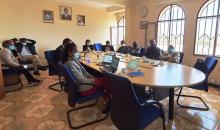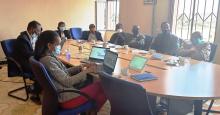Eritrea presents on the Regional Consultation on ICD-11 & CRVS
In November 2020, WHO and partners convened two workshops for technical staff leading and supporting improvements in Civil Registration and Vital Statistics (CRVS). This February, on the 9th and 16th, 2021 consultation convened with senior management, Directors, and Registrar Generals, to follow up on the technical trainings to determine Civil Registration and Vital Statistics (CRVS) improvement plans for implementation.
The consultation was attended by representatives from the office of the Minister of Health, Director General of Public Health, Family and Community health Director, representatives from Medical Services and National Health Information Systems; representative from the Local Government as well as the Ministry of National Development, namely the Statistics Office, and WHO technical officers. The virtual meeting was attended by more than 125 participants, from various countries in the African region and partners.
According to the recent SCORE (Survey, Count, Optimize, Review, Enable) for health assessment, only 1 country in the African Region can be described as having a sustainable capacity for CRVS. Up to 30 of the 47 countries (64%) had almost no capacity for CRVS and 13 (28%) had limited capacity. Noting the importance, the consultation was actively attended by stakeholders in Eritrea.
As per the objectives of the meeting, Eritrea developed a roadmap for CRVS implementation and held a stakeholders’ meeting, bringing together local government and statistics office. The country’s findings were presented in the regional meeting by Dr Mismay, Advisor to the Minister of Health, who gave a brief summary of the situational analysis in the country, from the four key aspects: Leadership and Governance, Data Quality and Analysis, Mortality Data Generation, Transmission and Storage as well as Communication and Use of Mortality Data. Furthermore, he outlined the country’s roadmap and strategies for successful implementation and roll out of CRVS.
The afternoon session covered panel discussion around the key thematic areas, with summaries and issues for consideration flagged by the panelist. This was followed by a question and answer session, that provided a platform for the participants to discuss key areas of CRVS.




